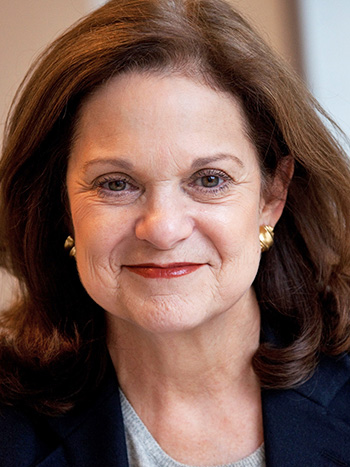
Native New Yorker Bryna Sanger, PhD’76, has spent her career giving back to her hometown and the next generation of policy professionals.
From conducting urban policy research and teaching students at the New School, a private research university where she’s spent the bulk of her career, to advocating for social services and proposing policies as board chair of United Neighborhood Houses (UNH), Sanger’s impact has been felt throughout the city.
“Growing up during turbulent times, I wanted to make a difference,” says Sanger, a member of Heller’s Board of Advisors.
At The New School, she’s toggled between faculty and leadership roles, serving as the dean of the Milano School of Policy, Management and Environment and chair of its Public and Urban Policy program. She was recently the deputy provost and senior vice president of academic affairs, overseeing all faculty recruiting, hiring, reviews and promotions, among other responsibilities, and today is back in the classroom as university professor of policy and management at The New School.
Through her job, she’s developed connections all over the city with organizations like UNH, which serves as an umbrella for the settlement houses of New York. She first became familiar with UNH when she ran the Laboratory in Issue Analysis at The New School, where teams of master’s students worked for clients like city commissioners and heads of nonprofit organizations, considering alternative policy proposals to respond to pressing public policy issues. She became chair of UNH’s board about four years ago.
“It’s like another full-time job, but I love it!” she says. Settlement house serve about 750,000 people across the city, offering everything from early education to summer work opportunities for youth to programming for the elderly. She helps UNH to raise money and lends her expertise as UNH advocates for and proposes policies to the city and state of New York.
That resulted in a “big win” last year, when UNH successfully negotiated with the city to gain pay parity for teachers who work in preschool programs at settlement houses, which will result in lower turnover and better-quality teachers.
“It’s a very exciting venue to see the wide range of social service needs in the city, and improve the outlook for our clients,” she says.
Sanger realized early on that she wanted to make a difference at the policy level. As an undergraduate at Vassar College, she shadowed a social worker during an internship.
“I saw what it was like on the ground, for someone trying to help at the level of the individual family. And my conclusion was that taking a clinical approach tied your hands, because the policy wasn’t up to the job. If you wanted to make real change in people’s lives, it was going to be through changing policy. As a young person, it was quite a revelation,” she says.
She chose to go straight to graduate school after college, wanting to gain the tools to tackle an emerging urban crisis and sharpen her focus on poverty and racial injustice. Heller was the perfect fit.
Sanger raced through her doctoral degree at Heller in just four and a half years. During that time, she worked in the Massachusetts governor’s office when he was proposing welfare reform legislation, as well as for the Food Research and Action Center, expanding and evaluating school lunch programs across the country.
Heller was a great launching pad for her career—and today, she thinks the school is serving its students even better with the addition of new degrees and classes.
“What students have more of today is the opportunity to take courses in management,” she says. “One of the things I learned from my research is that a lot of policy gets made at the management and implementation level. If you really want to be an effective policymaker you have to understand management.”
As a Board of Advisors member, Sanger regularly returns to Heller to offer her expertise and insights to students, faculty and the administration. She and her husband are also involved with Our Generation Speaks, an incubator that brings Israeli and Palestinian entrepreneurs to Heller each summer.
“I’m grateful to have had a Heller education. My career prospered as a consequence, and my Heller friends are still some of my best friends,” she says. “That’s why I give back and serve on the board. I want to help the next generation. Especially in these challenging times, a Heller education is needed more than ever.”
